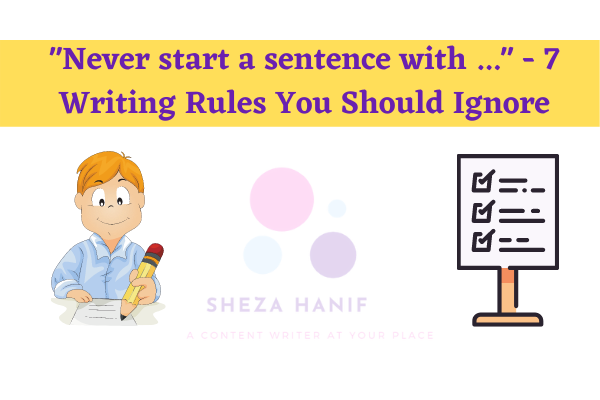In this article, you’ll learn why the best-selling writers flout these kinds of general writing rules and why you should do the same yourself. But first I will tell you about some questionable advice I received from the editorial staff of a newspaper.
‘Never start a sentence with me’
‘Never start a sentence with but’
A chief of a regional newspaper where I worked as a starting journalist told me that I should never start a sentence with a number. “It just doesn’t look good, we don’t do that in journalism,” he said.
He had just hired me as a Saturday employee to write atmosphere reports and news items. I didn’t want to lose that job. So I didn’t ask any further and decided to strictly obey the writing rule from now on. Whenever I spontaneously wrote a sentence with a number at the beginning, I changed the order.
One hundred thousand euros, that amount the municipality has donated to a foundation that helps homeless people.
Such a sentence became:
The municipality has donated one hundred thousand euros to a foundation that helps homeless people.
Writing Rules: Do not start a sentence with …
Nothing wrong with that. But when I later joined a children’s newspaper, the rule stuck in my head, even though it called for a looser writing style.
In 2013 I focused on longer stories for de Volkskrant and wrote a thriller. I still thought it was crazy to start a sentence with a number for a change. “It doesn’t look nice, we don’t do that”, I hear my old boss say. In short: the rule bothered me, it made me write.
I think this kind of writing rules echoes in many people’s heads while writing. We learn them in school, study or internship because someone wants to explain a general principle to us. There are many rules, especially about ways to start a sentence. Do not start with a number, because it does not look good. Do not start with ‘I’, because then you put too much emphasis on yourself.
Of course, there is a grain of truth in that advice, but we should especially not forget to regularly ignore these types of writing rules. A text gets better the more you vary.
In my Catchy Writing course you will learn the most important techniques to make texts varied and attractive, but first take an example of top authors such as Annejet van der Zijl, Dan Brown and Harry Mulisch.
Read More About:
Entry Level Copywriter Jobs: Let’s Talk About
9 Ways to Find Freelance Writing Clients Who Will Actually Pay You
6 unexpected ways you’ll benefit from writing content
The Importance of Article Writing And How To Do It Effectively
Below is an overview of five writing rules about the ‘beginning of sentences’ that these writers regularly break.
1. Never start a sentence with a number
My old boss wasn’t the only one who followed this rule. This advice is even reflected in de Volkskrant’s stylebook: ‘Avoid numbers at the beginning of a sentence. Try to construct the sentence in such a way that the number is placed further on ‘. Still, you can sometimes use a number to draw your reader’s attention to a distance or frequency.
‘Taking care of clean bed linen three times a day, sheets and blankets that are heavy with vomit and shit, that requires more from the body than making coffee and ensuring that there is enough gin in the house’ – Herman Koch – Zomerhuis met Zwembad
“A hundred yards behind the drone, near the statue of the dwarf on the turtle, three armed soldiers came deliberately down the steps, clearly heading for the cave.” Dan Brown – Inferno
2. Never start a sentence with ‘I’
I first got this advice in elementary school ( and I wasn’t alone ). Master Jacques warned that people who start many sentences with “I” draw too much attention to themselves. Yet one of the most famous books in the world starts with three times ‘me’ (one of which is crossed out). Successful business people are also not held back by the I rule.
‘I am fourteen years old. I’ve always been a sweet girl. – Alice Walker, The Color Purple
“I would be lying if I didn’t admit to being sad about our great airline merging.” – Richard Branson’s in an open letter to his customers following the merger of Virgin America and Alaska Airlines.
3. Never start a sentence with ‘because’
Because conjunction is usually between two words, it is strange to start a sentence with it. Yet Stephen King often starts his sentences with ‘because’. This gives his storytellers something human and flawed: they speak in half, imperfect sentences.
‘Because I was afraid of Spontaneous Ejaculation and the DNA that would result! Well, it didn’t, but I’ve jerked off a lot since then ” – Stephen King – Mr Mercedes
4. Never start a sentence with ‘and’
A sentence that starts with ‘and’ comes across as spoken language and not as the written language. And that is precisely the reason that many good writers make use of this sentence construction. The informal tone draws your reader into the story.
‘And we get to see a passer-by, quite sharply, thanks to the drawing detail of the collar, which would then not exist. In short, welcome to the world where everything can and cannot exist at the same time ‘- Harry Mulisch, The Discovery of Heaven
5. Never start a sentence with ‘except’
Another tip that literally comes from the stylebook of de Volkskrant. By ignoring the rule, you can emphasize a particular part of a sentence. That provides variation.
Besides being a handsome man, he seemed to have the heart in the right place. In another life, somewhere far away, she might even have a relationship with a man like Robert Langdon. ” Dan Brown – Inferno
6. Never start a sentence with ‘but’
Some people say you shouldn’t call yourself a writer if you start many sentences with just. With this conjunction, you suggest a contradiction, which gives the sentence a little more weight. I am often guilty of it myself, but fortunately so are Harry Mulisch and Annejet van der Zijl.
But this woman hadn’t stayed where she was born. On the contrary. On the contrary, she had let herself be driven across the world by fate, by her unrest or by a combination of the two. ‘ Annejet van der Zijl – The American princess
‘I wanted to go, go. But when did I finally get there? ‘ Harry Mulisch – Two women
7. Never start a sentence with ‘or’
Another conjunction, another rule that does not always hold true. Spoken language can work well as a writing language, especially in compelling thrillers. So break them, these kinds of rules.
‘Come on, brother! Or are you too old to climb over a wall? ‘ – Dan Brown – Inferno


Hi there! Do you know if they make any plugins to protect against hackers? I’m kinda paranoid about losing everything I’ve worked hard on. Any tips?